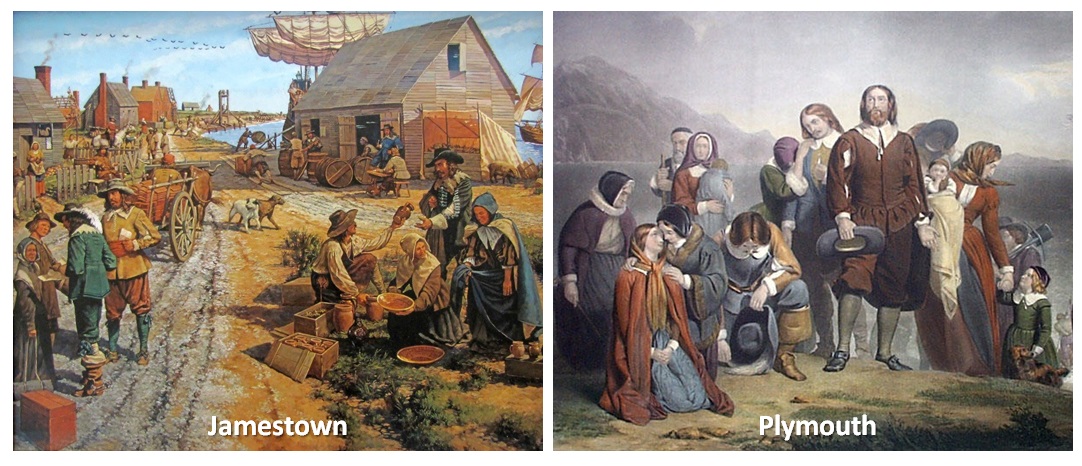The Evolution of the American Character
Pilgrims and Puritans in the New England Colonies
While the southern colonies were being established mostly for the sake of profit, a group of northern colonies was founded mostly for the sake of ideas
The New England Settlement was purposely founded for English radical Protestant refugees (Separatists - wanted to break from the Anglican Church altogether– later called Pilgrims).

THE PILGRIMS
The First wave of Separatists left Britain for Holland for freedom to practice Calvinism. Secured rights with Virginia Company to settle within its jurisdiction in Virginia
Pilgrims agreed to work for 7 years in return for the support of the joint stock company which was comprised of non-separatist investors. Profits would be shared among settlers & investors after 7 years.
Mayflower landed off New England coast with 102 persons. Fewer than half were Separatists and some historians suggest Pilgrims "hijacked" the ship and gained consent of non-separatists by issuing the Mayflower Compact.

Mayflower Compact (not a constitution but a game plan) 1620 to legitimize Pilgrims’ settlement outside Virginia by creating a secular document recognizing James I as their sovereign and creating a body of all the settlers with power to devise laws, and elect leaders. Yet Plymouth Colony never possessed a charter; it was denied by the crown.
Despite terrible first winter where over ½ the people died, no one left the colony
"The Pilgrims first winter of 1620-1621 took a grisly toll. Only 44 of the 102 survived. At one point only 7 were well enough to to lay the dead in their frosty graves. Yet when the Mayflower sailed back to England in the spring, not a single one of the courageous band of Separatists left. As one of them wrote, 'it is not with us as with other men, whom small things can discourage.'
SUCCESS of the PILGRIMS
Eventually settled in economically with fur, fish, and lumber. Religion remained paramount in the community

THE PURITAINS (MAP of Puritan Migration)
Why did the Puritians come to the New England?
Turmoil in England resulted in 15,000 more immigrants coming to New England (60,000 others scattered throughout North America & West Indies).
John Winthrop - Governor of Massachusetts Bay Colony Winthrop believed Puritans had a covenant with God to lead new religious experiment in New World "We shall build a city upon a hill"
Non-religious men and all women could not vote
Townhall meetings - all male property holders and at times other residents to vote and publicly discuss issues. Majority-rule show of hands.
THE SEDUCTION of PROFIT and GROWTH
Massachusetts became biggest and most influential of New England colonies. Fishing, shipbuilding, fur trade, lumbering; some dairy farming, and farming wheat & corn
Gradually as the New England colonies experience economic growth and prosperity they were pulled in the same direction as the Southern colonies. After 1700 commercial success made Boston a thriving town of merchants
Ideological Problems and Developments
Puritans had difficulty maintaining a consensus
Quakers, who believed in an inner light and not in theology, flouted the
authority of the Puritan clergy and were persecuted.
Anne Hutchinson (antinomianism - Christian theology that faith alone, not obedience to religious law, is necessary for salvation) and the "elect" didn’t need to obey God's or man's law because they were predestined for salvation. Antinomianism is the polar opposite of legalism, the notion that obedience to a code of religious law is necessary for salvation.
Roger Williams ("liberty of conscience") used "wall of separation" metaphor for church and state separation. Williams settles Rhode Island (1644) Complete freedom of religion, even for Jews and Catholics. Also Quakers. No oaths required regarding one's religious beliefs, no compulsory attendance at worship, no taxes to support a state church!
Thomas Hooker believed MBC gov't was too arbitrary and oppressive. His congregation also wanted more lands that MBC was unwilling grant. Connecticut (founded in 1636)
Fundamental Orders drafted in 1639 by new Connecticut River colony (First modern constitution in American history)
1. Established a democracy controlled by "substantial" citizens
2. Gov’t should be based on consent of the people.
3. Patterned Massachusetts’ gov’t.
4. Foundation for Connecticut’s colonial charter and later, its state constitution.
PROBLEM:
After the wave of dissention in the 1630s and 1640s (e.g. Hutchinson and Williams) conversions decreased dramatically.
The enthusiasm for undergoing church membership diminished the eagerness of second and third generation Puritans. As first-generation settlers were beginning to die out, their children and grandchildren often expressed less religious piety, and more desire for material wealth.